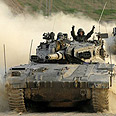
IDF tank near Gaza
צילום: רויטרס
Obstacle course in Gaza
Gaza operation to face legal constraints, hostile international opinion, and unfriendly media
Part 2 of analysis
Security officials have realized a long time ago that the time of “luxury” operations has passed. Today, any large-scale operation in the Gaza Strip would have to take into a count all sorts of constraints, including the following:
Legal constraints – The attorney general and IDF judge advocate general are apparently being presented these days with scenarios that greatly disturb the security establishment. As surgical strikes are difficult to execute in densely populated civilian areas, vis-à-vis an enemy that would deliberately utilize human shields as was done in Lebanon, we can assume that such operations would make Israel pay a price known in European capitals as “crimes against humanity.”
In 2008, the fear of the International Court of Justice at The Hague bothers military officials no less than commissions of inquiry threaten our politicians.
Civilian obligations – If on “normal days,” after complete disengagement, Israel is still burdened with the legal responsibility for daily life in the Strip, we can imagine the sort of civilian burden that may be imposed on it in case of an invasion. Past experience taught us that the length of such military operation hinges on the water quantity in Gaza’s tankers or the diminishing quantity of flour in Gaza warehouses. At this rate, soon we will see Israeli soldiers raiding Gaza while carrying bread, diapers, and baby food in their bags.
The power of the media – The familiar paradox can be expected to make another appearance. The global media is very much interested in “action” such as an invasion of Gaza, yet because of this very same media, the duration of the operation is expected to be cut short. Some close-up shots of casualties, particularly children and babies, will curb the “shelf life” of a military operation in Gaza. And we know how much the media love to photograph “troops withdrawing with their tails between their legs.”
International pressure – The Israeli tanks which Hamas is unable to stop will face another obstacle, in the form of an international American-European-Arab campaign. It will start with a series of protests by “moderate” Arab states directed at the US. This will be followed by European Union states, and then by the entire West. The UN in New York and Geneva will be competing against the Vienna-based UNRA in respect to showing empathy and compassion to the Palestinians. Seventy-two hours later, the US will be asking us: Well, when are you withdrawing?
The outcry of soldiers’ families – During operation Defensive Shield in 2002, the wives of IDF reservists demanded that the defense minister and chief of staff order an aerial assault aimed at razing the Jenin refugee camp, “so there is no need for the troops to face terrorists.” We should keep in mind that Gaza is made up of many Jenin-style refugee camps.
Ehud Barak realizes that in order for a military operation in Gaza to end successfully, Israel must free itself of all these constraints and convince the international community that this is a war of no choice. Yet those who think that even in such war we are allowed to fire at civilian population centers, curb the flow of food and medical equipment, prevent media coverage, disregard world opinion, and ultimately see thousands of dead Palestinians, should stand up now.
What then can we expect? We shall either embark on a failed operation but gain the world’s “understanding,” or launch a successful operation, which will come at the price of harsh condemnation.










